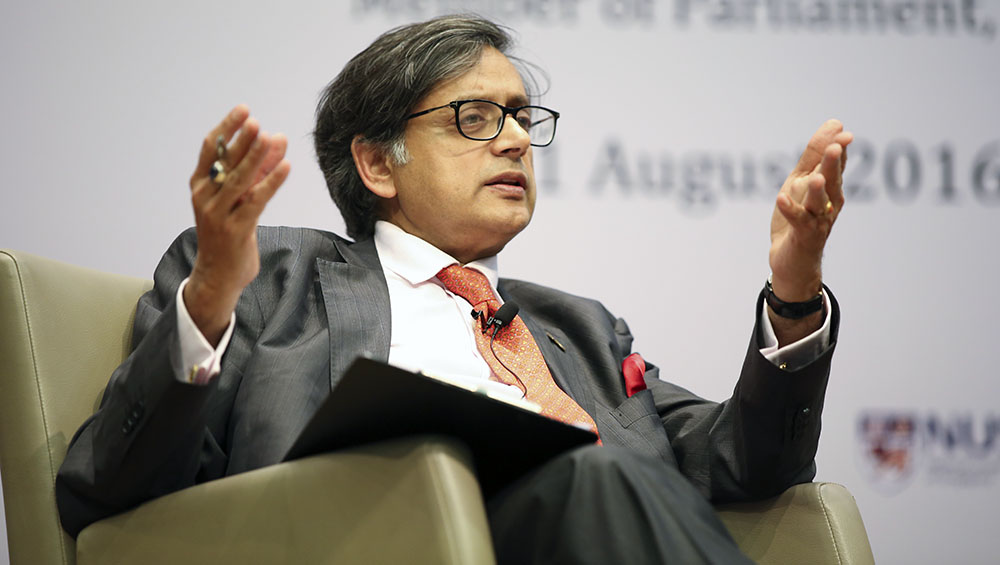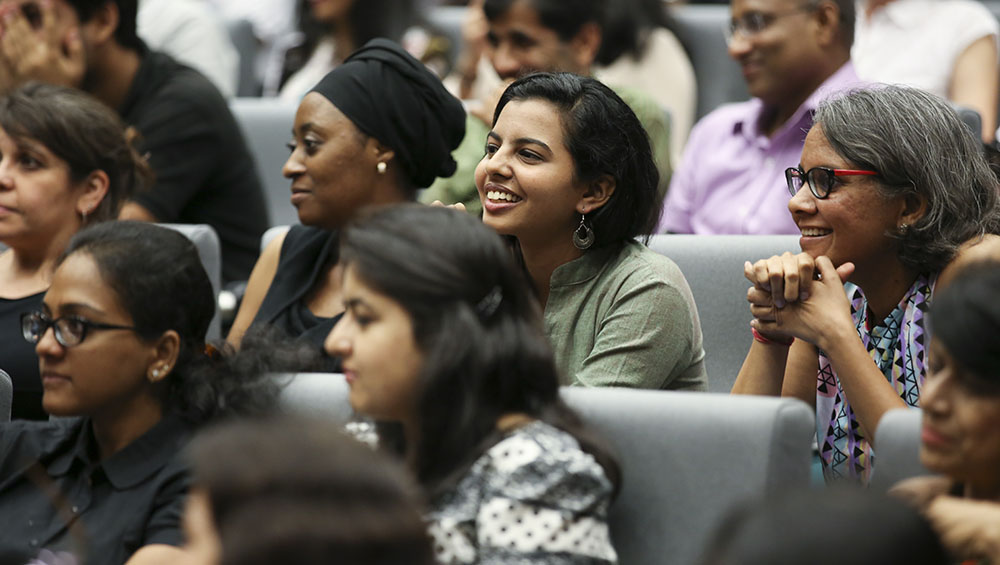
In a stirring address delivered at the NUS Lee Kuan Yew School of Public Policy on 31 August, Dr Shashi Tharoor, Indian politician, author, former diplomat and Under-Secretary-General of the United Nations, challenged the audience to re-examine the global landscape and rethink what it means for nation-states like India to be an influential voice in international relations and politics in the 21st century.
A World of Contradictions
Speaking on the role of India in the 21
st century, Dr. Tharoor presented an elaborate discourse of the country's historical challenges and its transformation to meet the needs of a globalised world, politically and economically. There is a need to articulate the paradox evident in our globalised world. The benefits of globalisation, such as technological progress, are very much required for the world to advance, but this comes at the expense of an increase in security threats, like terrorism. While the forces of globalisation bring us together, those same forces are driving us apart. Living with this paradox is at the heart of the challenges of this brand new world, said Dr Shashi Tharoor. A further challenge in an increasingly interconnected world is how to deal with diversity. Democracies around the world now play host to a variety of ethnicities and cultures and need to actively avoid succumbing to extremes. At one end of the societal spectrum there are autocratic societies which are against technology, pop culture, integrated markets and modernity; at the other end are societies where, globalisation runs rampant a world with fast music, fast computers and fast food, pressing nations into one commercially homogeneous theme park. Multi-ethnic co-existence, living in a diverse democracy does not require us to agree all the time, as long as you agree on the ground rules of how you will disagree, said the award-winning author.

The Rise of the Rest
While considering the dynamics of living in a vastly diverse world, it is also pertinent that mental models of the world, with perceptions based on the past and worse, on bias do not limit a country's potential. In a globalised world, there is a need to alter existing stereotypes of what individual countries can or cannot do. Skills, knowledge and expertise are transferring too rapidly for any nation to be discounted in any aspect. The best airlines are from the Middle East and Asia, as are some of the tallest buildings in the world. Moreover, the Chinese are paving the way for the future, with their ambitious Belt and Road Initiative, creating trade routes and business opportunities across Southeast, Central and South Asia, Europe, the Middle East and North Africa. A couple of decades ago, no one would mention India and technology in the same breath. Indians have been involved in approximately 40 percent of all start-ups in Silicon Valley. In the technology space, well-known Indian inventions and companies include the Pentium chip, Hotmail and Sun Microsystems, illustrated Tharoor. While the US remains a superpower, other countries are catching up fast in areas where once the US alone had been dominant. Growth projections for the BRICS[
I] countries Brazil, Russia, India and China indicate that they will collectively overtake the original G7 [
II] share of the global GDP by 2030 [
III], he added.
Redesigning Global Systems
As we attempt to do away with stereotypes, there is also a need to acknowledge the dominance of a handful of small, industrialised Western countries, especially in the international financial institutions. The Bretton Wood Institutions the International Monetary Fund (IMF) and the World Bank appear increasingly anomalous in a world where economic dynamism is shifting from the West to the East. A system redesign of global governance is therefore required one that will allow countries like China and India to participate in a manner equal to their capacity. For example, while India has been a rule taker in international affairs in the past, it is now ready to join the ranks of rule maker and participate in constructing the international system. With its capacity, experience, track record and technology, it is poised to claim an increasingly significant role in managing the global commons on a variety of issues. India should play an increasing role in pushing for a redistribution of power, not only in the United Nations Security Council but in financial institutions like the IMF and the World Bank. Setting up the New Development Bank under the BRICS, would provide an alternative to the West-dominated World Bank and IMF, asserted Tharoor.

One Country, Many Roles
As developing countries like India take on a more influential role in international affairs, it is probable that in the course of pursuing different goals, India's many roles will sometimes overlap. The diplomat mentioned how India aims to play an influential role within the UN, while also giving a lot of importance to the South Asian Association for Regional Cooperation. India belongs to the Non-Aligned Movement as part of its anti-colonial heritage, which is very much against the West. But it also plays a leading role in the community of democracies alongside the very Western countries that it criticises. It is a leading light in the global trade union of developing countries in the G77 [
IV] and also a leading light in the global management union; the G20 [
V]. While it seems contradictory, it is in fact the kind of networked world we live in, he added.
A Grander Vision
Ultimately, it comes down to thinking beyond conventional international relations to cooperative relationships in the networked world. A global perception change, which allows developing countries a role commensurate with their growing capabilities, is not just desirable, but required for the world to advance as a whole. While the purpose of any country's foreign policy should be the security and well-being of its own citizens, what needs to change is the old autarchic behaviours such as throwing up barriers. As countries around the globe proudly celebrate their respective independence days, there will come a time where countries realise that in this globalised world, every other day is really an
interdependence day, concluded Tharoor.
- Brazil, Russia, India, China and South Africa
- Canada, France, Germany, Italy, Japan, the United Kingdom, and the United States
- Verified: http://www.newsweek.com/brics-overtake-g7-2027-76001
- The Group of 77 (G-77) was established on 15 June 1964 by 77 developing countries signatories of the Joint Declaration of the Seventy-Seven Developing Countries issued at the end of the first session of the United Nations Conference on Trade and Development (UNCTAD) in Geneva.)
- The G20 is an international forum for the governments and central bank governors from 20 major economies.